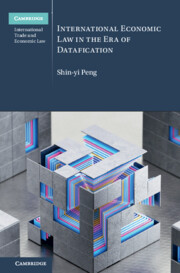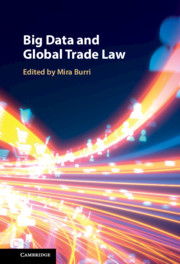Refine search
Actions for selected content:
3 results

International Economic Law in the Era of Datafication
-
- Published online:
- 28 March 2024
- Print publication:
- 04 April 2024
-
- Book
-
- You have access
- Open access
- Export citation
3 - Global Law in the Face of Datafication and Artificial Intelligence
- from Part I - Systemic Shifts in the Global Economic Order
-
-
- Book:
- Artificial Intelligence and International Economic Law
- Published online:
- 01 October 2021
- Print publication:
- 14 October 2021, pp 54-69
-
- Chapter
-
- You have access
- Open access
- HTML
- Export citation

Big Data and Global Trade Law
-
- Published online:
- 09 July 2021
- Print publication:
- 29 July 2021
-
- Book
-
- You have access
- Open access
- Export citation
